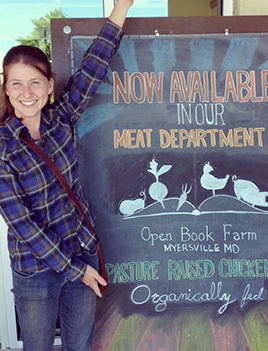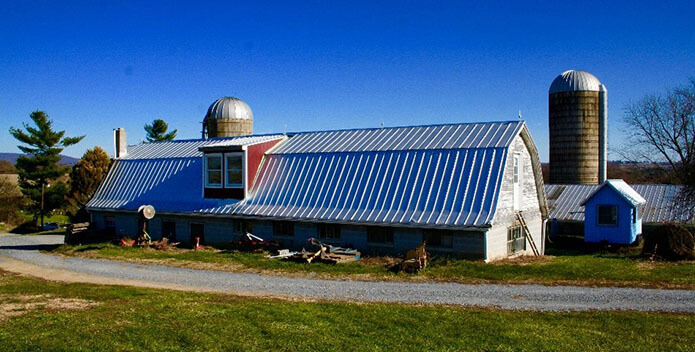Nestled contently in Maryland's Middletown Valley lies Open Book Farm. Originally owned by a family that possessed the land since the Revolutionary War, the farm is now trusted to the caring hands of Mary Kathryn (MK) and Andrew Barnet. Spanning 190 acres, the farmland rolls over gentle hills with Catoctin Creek marking its back border. The name "Open Book Farm" truly describes the philosophy MK and Andrew run their farm by: be as transparent as possible. They want their customers to know exactly what they are buying, as well as how it was grown. Such a notion is comforting in an age of unclear labels and unknown sources.
Open Book Farm is unique in that it functions as both a vegetable and a livestock farm. To some, this may sound complicated or even contradictory. However, MK describes the process as "synergistic". For example, the waste from the chickens can be added to the soil to grow vegetables. Then any rotten or unsold vegetables can be, in turn, fed to the chickens. The farm produces a variety of Certified Organic vegetables including tomatoes, spinach, carrots, kale, Swiss chard, lettuce, and much more.
As far as animal products, the farm supports a 100 percent grass-fed beef herd, pastured pigs, turkeys, and chickens. Because the livestock are pasture-based and continuously rotated, the animals have a healthy diet and their manure returns directly to the soil. When livestock eat grass, they do not need to feed on corn or soy beans, both of which include growing operations that result in substantial amounts of sediment and nutrient pollution, primary pollutants of the Chesapeake Bay. Remarkably, rotationally grazed pastures and a grass-fed diet can lead to at least an 87 percent sediment pollution reduction on the farm.

MK Barnet and her husband Andrew, owners of Open Book Farm, have implemented several environmentally and consumer friendly practices on the farm.
Open Book Farm
Not only do MK and Andrew Barnet run a sustainable farm, they also practice direct marketing to consumers. They possess a loyal, local, customer base in Middletown, MD, and the surrounding areas, and sell their chicken to the Common Market in Frederick. Their products can also be found at the Petworth Community Market in Washington D.C.
Their goal is to meet people where they are, whether that be regarding finances, location, or the way they approach food, nutrition, and cooking. Consumers care about locally and sustainably grown products. Open Book Farm wants to provide such healthful products.
The Barnet's have also participated in two major tree plantings with the Chesapeake Bay Foundation (CBF). Working with Rob Schnabel, a restoration scientist with CBF, over 100 volunteers came out in April and November of 2017 to plant trees on the farm. These volunteers were planting riparian tree species (stream side species) to create a forest buffer. Because of their ability to act as natural filters, trees serve as the best form of land use to protect against farm runoff and to increase water quality in the waterways on and near the farm. Catoctin Creek, which boarders the Barnets' farm, drains into the Potomac River, ultimately ending up in the Chesapeake Bay. Planting these trees and implementing rotational grazing for their herds is vital to the Bay's health.
When asked why it is so important that they run such a sustainable farming operation, MK replied, "I was the kid who was always concerned about recycling, and I always wanted to be outside". She explained that it only made sense to carry such principles of caring for the environment into her adult life. The Barnet's are also young farmers at a time when the average farmer in the country is 60 years old. In Maryland alone, over half a million acres, 25% of Maryland's farmland, is owned by those 70 years old and older. These statistics are not unique to Maryland and they match nationwide trends.
Transitioning sustainable farming to the next generation is key to growing healthy food for the country. This week, the Barnet's, and hundreds of other young farmers, are attending the 19th annual Future Harvest Conference in College Park. Registration for the conference is available to the general public and open now. The conference brings farmers and consumers together to "Cultivate the Chesapeake Foodshed". The Chesapeake Bay is fortunate to have both MK and Andrew Barnet running a farm that can serve as a model to people everywhere, showing how to do their part in saving the Bay while growing healthy food from farm to table.

Issues in this Post
Agriculture Conservation Land Use Runoff Pollution Water Quality CBF in Maryland



